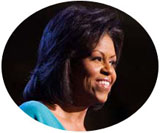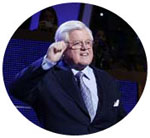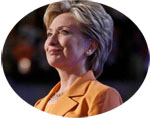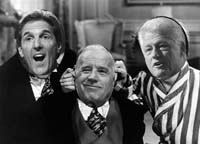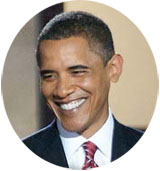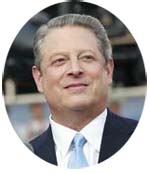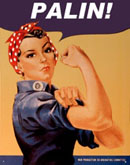|
|
|
|
by Dennis Foster |
|
|
|
|
| For years, I been a political junkie. In junior high school, I followed the 1968 presidential primary campaign fairly closely. In 1972, as a freshman at Drake University, in Des Moines, Iowa, I did volunteer work for the Nixon campaign. The resignation of Spiro Agnew, and the impeachment of the president led me to change my party affiliation. In 1976, I saw almost all of the Democratic candidates - somehow, I missed Jimmy Carter! I supported Shriver, but he faded fast, and I turned my support to Udall. In the fall of 1976, after graduating, I did some legwork for the independent campaign of Eugene McCarthy. I still think that his stance against campaign finance reform should stand out as one of the finer moment of principled politics. I decided that third party candidacies are rather futile, but still I think I voted for John Anderson in 1980. His bolting of the Republican party was quixotic, but his embrace of fiscal conservatism and social liberalism served as my entree into libertarian political views. I recall voting for Reagan in 1984 because he seemed likable, and Bush in 1988, because he seemed competent. I decided that competence was not necessarily desirable, given that he squandered away his huge favorability ratings. I voted for Clinton twice, as he did seem to be a more reasonable Democrat; after all, just recall all the carping that most still engage in over NAFTA, which is probably his premier accomplishment. Then, I turned to the younger Bush for two terms, although I have been quite uneasy over his big spending "compassionate" conservative ways. And, I supported McCain despite his awful free speech record and his embrace of cap and trade for bogus global warming reasons. Well, it's not a perfect world. Some may say that I exhibit a fierce independence when it comes to politics; others may say that I am obviously quite confused! Regardless, the blogging experience gave me the opportunity to comment on the daily events at the conventions during the summer of 2008. Here they are, altogether in one place. | |
|
|
|
|
Of course, the highlight of the evening's show was Michelle Obama, wife of the candidate. She was personable and gave a good speech. I would echo Juan Williams comments, made on Fox, that it held special cultural significance and that it served as a role model for a stable middle-class black family. But, when it came to content, we heard only the same shallow rhetoric that filled the primary season. I really don't know what is meant by saying that Barak Obama will "bring about the change we need." This was especially awkward in the context of Ms. Obama's rousing story of her success - strong, hard-working father, close knit family, the wherewithal to send both kids to college, etc. One would think that her story is an example of what is right with this country, and not the foundation for the "change we need." I just don't get it.
The star of the night was really Ted Kennedy. Man, can the guy talk a good line. I don't buy the whole "health care is a fundamental right, not a privilege" nonsense - as Ayn Rand pointed out so many years ago, if you have a right to something like health care, then someone is obliged to provide it, and that obligation is going to come at the point of the gun wielded by the government. Still, he seemed in his usual top form and gave a stirring talk. The video tribute, done by Ken Burns, fell flat for me. It is hard to feel some special connection to someone who owns a giant sailboat and is able to flit about the ocean with his family. It just doesn't resonate with the lifestyle of the common masses. |
|
|
|
|
|
The keynote speaker was Mark Warner, candidate for the Senate from Virginia (and former governor). Boring. He didn't seem especially passionate and his message was convoluted - from his participation in the cell phone revolution (hmm . . . he's starting to sound like Al Gore, who invented the internet) to 100 mpg hybrid vehicles for all. The worst was his "complaint" that George Bush's major flaw was that he failed to rally the American spirit after 9/11. Awful. Montana Governor Brian Schweitzer was more animated and did a much better job of rousing the crowd. Still, the content of his message was weak, from arguing for tax credits to consumers that buy hybrid cars (ouch!) to his remark that "petrol dictators will never own American wind and sunshine." Well, that kind of talk is bound to make us friends and influence people. Not! Hillary was the highlight, naturally. She gave a great performance, although she could have paused at times when the crowd was all riled up and thunderous in their applause. Instead, she kept surging through her speech, which struck me as unusually short, ringing in at just a tad over twenty minutes. I doubt that Bill will be that brief tonight! Here are some of the parts that caught my attention . . .
I think one thing was clear from her performance - she would have been a much stronger candidate against McCain than Obama will be. Will she run against a President McCain in 2012? Probably. Will she run in 2016 if Obama gets two terms? Probably not. |
|
|
|
|
|
Clinton was in fine form, feeding off of an appreciative audience. He speaks well, and carries it off with a great deal of conviction. But, since we know that little of what he says is actually true (yes, yes, yes, I know it all depends on what the meaning of "is" is), we can write him off as stooge #1 for the night. Some of his antics included:
Next up was John Kerry, the last standard bearer of the Dems. It's too bad Fox cut away from this exercise in tomfoolery - it must be their liberal bias showing. CNN and MSNBC showed this speech, although I watched it on C-SPAN (as I did with all the speeches). He was a bit humorous in his attack of McCain, essentially calling him a flip-flopper [Before McCain debates Obama, "he should finish the debate with himself."]. I think that Kerry was poking fun at himself, the king of flip-floppers, but maybe it was just subtle advice. His throwaway line about being in "the wrong war, in the wrong place at the wrong time" begs the question of what the right war/place/time would be. He didn't specify, naturally. Finally, his attempt to tie Obama to the military by referring to Obama's grandfather and great uncle was laughable. Joe Biden gave the final speech for the night, in his acceptance of the Vice Presidential nomination. I have watched Biden for years - well, he has been in the Senate for 36 so far - and, sometimes he says sensible things. Then there are times when he is just a loon. He made a few minor slip-ups, but otherwise carried off the style portion of the competition well. His shtick with the Obama/McCain contrast ("That's not change, that's more of the same" and "That's the change we need.") was entertaining. I suspect we'll hear more of this over the next two months. Otherwise, some of the oddball things he had to say included:
|
|
|
|
|
|
For a while, I thought Al Gore might actually downplay his whole global warming crusade, as his talk began with lots of regular partisan rhetoric. He did mention the "borrow from China to pay for oil from Saudi Arabia" line and did so in a way that made me think that this was his line to begin with. Well, you never know with this guy! I thought his most memorable, and funny, line was about how "Big Oil and Big Coal have a 50 year lease . . . on the Republican Party." Of course, most of his immediate audience certainly took it as literal truth rather than as a witty turn of a phrase. I did not remember him ever mentioning either of the Clintons, although he made a point to say that Joe Biden's acceptance speech was great (which, of course, it wasn't). Still, the former Veep was at his pompous "best" when he compared Obama to Abraham Lincoln. Maybe Obama should start wearing a stovepipe hat . . . ? Obama's fifty minute speech was, as usual, articulate and had more of the kinds of specifics he used in his primary speeches. The short biographical video was interesting, although the attempt to downplay his ivy league education just continues to astound me. While there had been some hubbub about the Greek columns, the backdrop looked like a stylized version of the White House, which I think was smart. As to content, we were once again made to believe that our economy is worse than the Great Depression. How ironic that second quarter GDP figures came out that morning, showing robust growth of 3.3%. Well, we wouldn't want anything like economic growth get in the way of our fairy tale narrative! Indeed, as he went through a litany of personal stories of economic hardship all I could think of was that here was the ultimate lazy social activist. If some people need help, start a charity to help them; don't try to shove a hugely wasteful government program down our throats just because you and your friends are too lazy to do something about these "problems." Obama went on and on about something called the "American Promise." Exactly what that means, and how it differs from what we generally call the "American Dream" escapes me. He did mention a few points here which just sounded like our existing system (e.g., that the market should reward innovation), but other points were disturbing - "Business has the responsibility to create jobs and take care of workers." Delusional. Obama did spell out what kinds of changes he would promote. Here are some of them:
There was more, of course, but these were some of the lowlights for me. I thought that his deferring on a Martin Luther King reference until the end of his speech was also smart. The more he tries to take on the mantle of the portion of black America that descended from slaves, the worse he looks. The only one in his family background that ever had suffered any racial prejudice in America is him, and he is running as a major party nominee for President. So, I give him some kudos for drawing some of these connections in a subtle manner (versus, say, a Jesse Jackson). He did much to make this election a "crossroads in history" and he pledged to "march into the future" which makes this historic event one that may be better described as histrionic. |
|
|
|
|
|
President Bush gave an effective speech, but it wasn't especially rousing. Fred Thompson, on the other hand (pictured to the right) was in top form, detailing John McCain's wartime experiences and telling the audience that McCain has "character you can believe in." I thought it was quite powerful, as I did not know much of the details of McCain's imprisonment in the Hanoi Hilton (except that he was and it was for many years). Unlike his performance at the Defending the American Dream Summit last fall, Thompson was lively and engaged. While Obama was not often identified by name, I thought that the subtle dismantling of the aura that surrounds him was masterful. When Laura Bush talked about Cindy McCain's trips to various world hot spots, all over just the last eight months, Obama came off looking even more superficial. And, the unrelenting criticism by Lieberman, the Dems Veep candidate of just eight years ago, were stinging. Well, my view is that Obama entered into the race thinking he would lose to Clinton, but that he'd have created a national following that would propel him into the White House in 4, or 8 years. In an odd sort of way, it is unlucky of him to have beat Hillary! |
|
|
|
|
|
Mitt Romney was OK, but not his usual self. The quip about keeping Al Gore's private jet on the ground was a good one, but we've heard this before. Mike Huckabee was personable and his defense of the notion that not all conservatives are rich was well done. His best line was about how Sarah Palin got more votes for mayor of little Wasilla, AK than Joe Biden got running for President. Laura Lingle, governor of Hawaii, was fine, but not an especially rousing speaker. Rudy Giuliani was looking quite comfortable at the podium and relaxed as he goaded the crowd with his commentary against Obama. Finally, we have heard from someone that has taken Obama to task for promising to use public financing for his campaign and then changing his mind on that - for obvious reasons. Rudy's litany of how Obama had broken many promises ended with this snortler: "If I were Joe Biden, I'd want to get the VP thing in writing."
|
|
|
|
|
|
The video on Cindy McCain was well-done. She has an interesting background, and her experiences around the world are quite inspiring. Likewise, the video on John McCain was powerful and had its moment of humor - "John McCain is" . . . (somber music) . . . "a mama's boy" (cut to his mother). I don't recall the same kind of easy-going humor at the Dems convention. Did I miss it? McCain's speech was strong and I give him lots of points for style. He shrugged off the protesters well enough ("Ignore the ground noise and static."), who did a good job of making fools of themselves and their worthless cause. His rhetorical flourishes - "Change is coming" and "We believe ...," and "Stand up; Stand up" - were comparable to the skills exhibited by Barack Obama, which I didn't think would be possible. As to the substance of McCain's remarks, I give him a resounding "McMaybe." He was clearly appealing to the middle ground, which he must do in order to win the election. Post-convention data show that he actually had a bigger audience than Obama, which is a shocker. The nuts and bolts of his speech included the following:
|
|
|
|
|
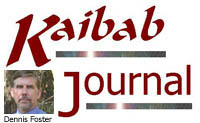


 Democrat
& Republican Conventions - 2008
Democrat
& Republican Conventions - 2008